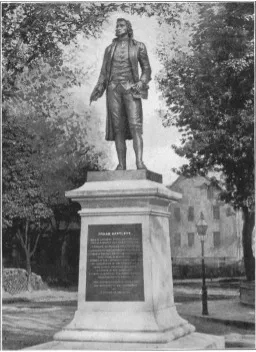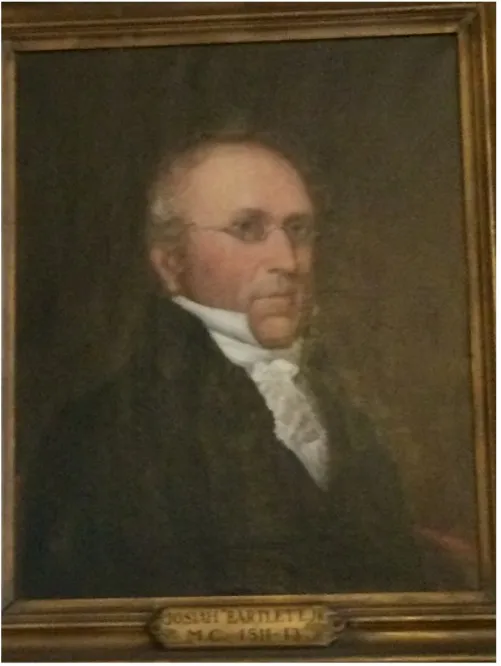Dr. Josiah Bartlett
Treat the Patient, Not the Disease
New Hampshire’s first elected governor and a signer of the Declaration of Independence, prepared a charter petition that he and eighteen other physicians presented to the legislature that resulted in their incorporation as the New Hampshire Medical Society. As passed by the General Court of New Hampshire, this act was signed into law on February 16, 1791, by Dr. Bartlett, as the state’s chief executive. On May 4th of that same year, at Lamson’s Tavern in Exeter, he drafted its constitution, was elected its first president, and led the Society at this first meeting and for the next two years.
Treat the Patient, Not the Disease
Dr. Bartlett (Nov. 21, 1729 – May 19, 1795), was a distinguished physician, Granite State patriot, and one of our country’s founding fathers. He practiced medicine in New Hampshire for nearly a half century following formal public education available at the time and a five-year apprenticeship to another noted Colonial-era physician. As a medical practitioner in Kingston and the southern region of New Hampshire beginning in 1750, Dr. Bartlett developed a reputation among his colleagues and patients as a man of independent thinking, keen understanding and outstanding ability. Much has been published concerning these, and his other qualities, earning him a tribute as “the man who treated the patients instead of the disease.”
As a physician leader with considerable energy and intellect, Josiah Bartlett became involved with public and political affairs beginning in 1765 that included several other “careers” which would last for three decades, distinguishing him as one of our nation’s and state’s founding fathers. He was actively engaged as a representative from Kingston in the colonial Provincial Assembly and served as a colonel in the Royal Militia – the highest ranking military officer of the province. Many future Revolutionary War soldiers received early training under Colonel Bartlett’s command. Yet, Dr. Barlett was subsequently stripped of all offices for taking the colonial side in the bitter controversies leading to the revolt against Great Britain. Shortly thereafter, his home was burned to the ground allegedly by loyalist spies in early 1774.
Rebuilding his homestead (which stands today in Kingston) that same year, Dr. Bartlett then served as the Granite State’s principal delegate to the Second Continental Congress. In fact, from the later half of 1775 through mid-1776, he was the only delegate attending from New Hampshire. Much of the work of the Congress was carried out in committees. The most important of these had a delegate from each state, which meant that Bartlett served on all of them, including those of safety, secrecy, munitions, marine, and civil government. After his continued letters to the General Court and Committee of Safety in New Hampshire, William Whipple and Dr. Matthew Thornton were added to the delegation in Philadelphia in 1776.
The Originator of “First in the Nation”
As the first to vote for independence from Britain on July 2, 1776, it is said that Dr. Bartlett “made the rafters shake with the loudness of his approval.” On July 4th, he was also the first to vote in favor of adopting the Declaration of Independence (as the roll was called geographically from north to south among the then thirteen colonies), calling it “the greatest state paper ever conceived by the mind of man.” A month later, he was the second to sign the document, after John Hancock who was the President of the Continental Congress. Dr. Bartlett also served in 1776 as one of the original drafters of the Articles of Confederation (precursor to the 1789 U.S. Constitution).
While on leave from Congress in 1777 and serving in the General Court, Dr. Bartlett was sent by the state’s Committee of Safety (of which he was a member) to advise John Stark and attend to the wounded from the Battle of Bennington. Given an independent command by the General Court only a month earlier as brigadier general of the New Hampshire Militia, Stark had led the battle’s victorious force of 1,492 New Hampshire, Massachusetts and Vermont militiamen. Dr. Bartlett employed his adroit political skills to subsequently ease concerns about the state militias’ independent actions by then traveling to meet with the Major General Horatio Gates in New York and authoring the compelling arguments for Stark’s return to the Continental Army by corresponding with colleagues in the Continental Congress. Stark won his coveted promotion to brigadier general and recommission in the Continental Army by Congress later that year.
Dr. Bartlett returned to Congress in mid-November 1777 casting the first vote for the Articles of Confederation. And again, he was the first to sign the Articles on July 9, 1778 which was to be one of his last actions in Congress.
In addition to his remarkable medical, military and political careers was superimposed a fourth – that of New Hampshire’s judiciary. Returning to New Hampshire, Dr. Bartlett was appointed as Chief Justice of the Court of Common Pleas in 1779, and in 1782 became an Associate Justice of the Superior Court, serving as the state’s Chief Justice beginning in 1788.
With his keen interest in the Granite State’s and our nation’s basic form of government, Dr. Bartlett had a significant hand in the drafting and adoption of the New Hampshire Constitution of 1784. He was also part of a trio (along with John Langston and John Sullivan) who led the campaign at the Granite State’s convention to approve the proposed federal constitution. Ratified by eight other states and requiring nine, the U.S. Constitution was officially rendered operative on June 21, 1788 by a vote of 57-47 in the Old North Meeting House of Concord. As such, New Hampshire was admitted as the ninth state of the United States of America – handing George Washington and Alexander Hamilton their victory for a federalist model of government that we know today.
Declining election by the state legislature to be one of New Hampshire’s first Senators to the United States Congress in 1789, Dr. Bartlett was overwhelmingly elected President of New Hampshire in 1790. And with an amendment to the state’s constitution in 1792, he became the first elected chief executive of New Hampshire to bear the title of “Governor” serving until 1794 when he retired from public life.
Three of his children and seven of his grandchildren followed in his medical footsteps and became physicians. The portraits of Dr. Josiah Bartlett and Dr. Josiah Bartlett, Jr., can be found in the Executive Council Chambers on the 2nd floor of the New Hampshire State House, along with a high chest dresser (74” h) made for Dr. Bartlett.
